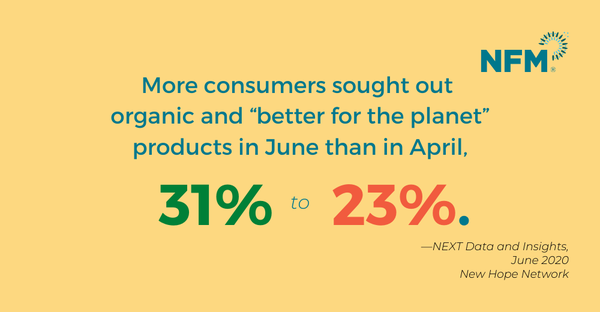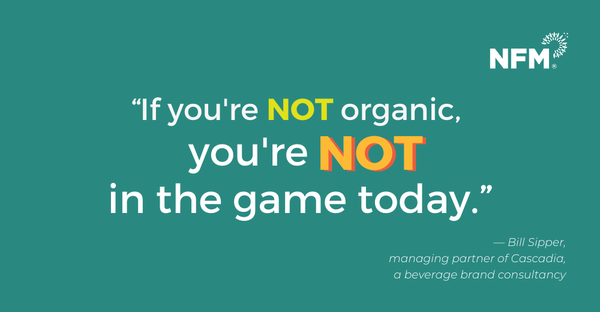
Already have an account?
The new year may have begun with bubbles and high expectations for the natural beverage sector. But all that quickly went flat as the coronavirus triggered a domino effect on the nation's economy and collective psyche, abruptly changing the ways retailers and brands do business and consumers fill their shopping carts.
Categories that had been riding a wave of growth, including shelf-stable energy and other functional beverages—up 21.7% in the natural channel in 2019, according to SPINS—suffered in early 2020, as customers stocked up on shelf-stable water, carbonated beverages, juices, coffee, tea and other staples, thereby eliminating the need for frequent grocery store runs amid quarantine. For the same reason, grab-and-go beverages such as ready-to-drink teas, coffees and juices also took a hit early on, with consumers shopping the inner aisles for long-lasting and familiar comforts.
Wellness goes mainstream
Despite the massive shift in purchasing habits this spring, many product categories that faltered are slowly recouping market share as people once again change what and how they buy. According to consumer behavior surveys conducted by New Hope Network's NEXT Data and Insights in June 2020, shoppers are finally starting to calm down, read labels and become more conscious of the connection between the products they purchase and their health. The number of people willing to buy higher priced products with better ingredients or health benefits grew from 18% to 26% from mid-April to mid-June.
The increasing desire to eat and drink for health—a longtime tenet of the natural products industry—presents natural brands with a unique opportunity to expand their customer base to include a more wellness-minded public at large. Natural beverages, already at the fore of innovation in terms of functional ingredients, are especially well positioned to do this.
Refrigerated beverages with immune-supporting ingredients will be particularly important, growing beyond where they were headed pre-COVID-19 to reach new heights of "beverage as medicine," says Julie Terrazzino, senior category manager of beverages for KeHE. She also believes this new focus will make demand for these products more mainstream, with more and more consumers seeking "to drink and eat products that keep them healthy and help boost immunity."
Jamba Dunn, CEO of Colorado-based functional beverage brand Rowdy Mermaid Kombucha, agrees: "I think we'll see more people starting to adopt functional beverages and bring them into their diets on a regular basis," he says. "And as the market comes back, we're going to expand our community to more people outside of the natural set."
Of course, enhancing immunity is only one of many health-boosting functions that will appear on consumers' wish lists. Sales of refrigerated beverages with functional probiotics have increased 22.7% this year in the natural channel as defined by SPINS, according to Scott Dicker, the research firm's customer insights manager. "In a post-pandemic world, we'll likely see consumers buying more immune-regulating, probiotic beverages to help suppress sickness before it starts," he predicts. Inflammation, sleep, stress, rest and recovery are other top consumer concerns that brands and retailers should address as they formulate product, merchandizing and marketing plans.

For people and planet
Despite concerns that the positive trend in organics—sales were up 5% overall in 2019, according to the Organic Trade Association—might falter because of the economic aftermath of the pandemic, the opposite is proving true. As people rushed to stock their pantries this spring, sales of organic milk, eggs, packaged foods, frozen items and other products experienced as much as double-digit growth, OTA reports.
Though some might attribute this to the panic buying of any available goods, the NEXT Data and Insights consumer survey shows a growing number of respondents seeking out organic and "better-for-the-planet" products this year: 31% in June versus 23% in April. And while the traditionally higher price points of organic products could be a barrier in a depressed economy, the inflated prices of many conventional goods today may help close the gap and further incentivize health-aware consumers to buy organic.
In natural beverages, organic certification should be a no-brainer, says Bill Sipper, managing partner of Cascadia, a beverage brand consultancy. "If you're not organic, you're not in the game today," he insists. "It's almost a step that everyone needs to take to be credible." And with functional beverages, in particular, organic certification is a big part of answering consumers' desire for enhanced wellness, as it helps promote trust and transparency about the product and its ingredients.
Value forward
A greater focus on health and wellness doesn't mean value isn't still extremely important to consumers—it's more important now than ever. "I think America will be looking for ways to find value in their drinks, so brands and retailers need to meet consumers where they are and provide promotions and value to them," Terrazzino says.
But what is value? Although the economic impacts of the pandemic are certainly making it harder for many to make ends meet, with today's customers more willing to pay a higher price for healthy products, the concept of "value" in beverages may also encompass those that offer functional and health benefits.
Value in today's world might also mean offering consumers something new and different. After months cooped up at home, people are ready for some excitement, Terrazzino says. This translates to big opportunity for innovative beverages that can serve up the same categories in different ways while meeting consumers' desire for functionality, she adds.

Innovating for the future
For Dunn, innovation in today's world not only entails pivoting more toward digital communications, creating more robust supply chains and focusing on new product development. It also means adapting to new consumer buying patterns. "We've noticed that multi-serve packs have been on the upswing in our category for kombucha," he says. "We think that's going to continue since people don't want to go to the store as often, and when they do, they want to get everything they need."
Innovation on all levels is the way forward, adds Dunn, whose positive attitude is infectious. "We're very optimistic right now, even though national news is on such a downward spiral," he says. "I truly feel like the functional beverage category is going to see tremendous growth in the years to come."
About the Author
You May Also Like
.png?width=700&auto=webp&quality=80&disable=upscale)





